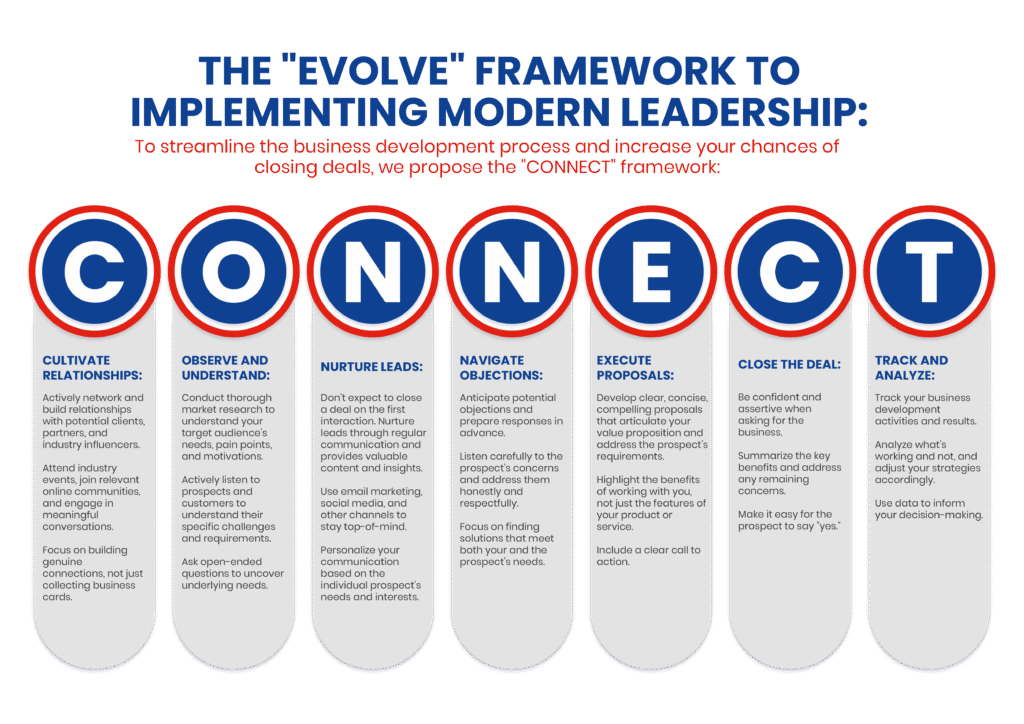In the competitive landscape of modern business, simply having a fantastic product or service isn’t enough. You need a robust business development strategy and the skills to execute it effectively. Whether you’re a small business owner, an entrepreneur launching a new venture, a sales manager leading a team, or a business leader overseeing multiple departments, mastering the core essentials of business development is crucial for sustainable growth and success.
The process isn’t just about “sales” in the traditional sense; it’s about building relationships, identifying opportunities, understanding your market, and closing more deals.

Understanding the Foundation of Business Development:
Business development is often misunderstood as being synonymous with sales. While sales is undoubtedly a business development component, the scope is much broader. Business development encompasses all activities that generate long-term value for an organization, from customers to markets and relationships. It’s a holistic approach integrating marketing, sales, project management, product development, and strategic partnerships.
Key Elements Of Business Development Include:
Market Research and Analysis: Understanding your target market, identifying customer needs and pain points, analyzing competitors, and spotting emerging trends.
Lead Generation: Identifying and attracting potential customers through various channels, e.g., networking, content marketing, online advertising, and referrals.
Relationship Building: Cultivating strong relationships with prospects, customers, partners, and other stakeholders.
Opportunity Qualification: Assessing the viability of potential deals and focusing efforts on the most promising opportunities.
Proposal Development: Creating compelling proposals that clearly articulate the value proposition and address the prospect’s specific needs.
Negotiation and Closing: Effectively negotiate terms and secure agreements that are mutually beneficial.
Strategic Partnerships: Identifying and collaborating with other businesses to expand reach, access new markets, or enhance offerings.
Account Management: Nurturing existing customer relationships to foster loyalty, repeat business, and referrals.
Networking: Getting out of the office to find key connections for your business and industry.
The process of business development is not universally applicable. The specific activities and strategies will vary depending on the industry, company size, and target market. However, the underlying principles remain the same: identifying opportunities, building relationships, and creating value. It’s a long-term game requiring patience, persistence, and a strategic mindset.
Essential Skills for Business Development Success:
Regardless of your specific role, mastering the following skills is crucial for effective business development:
Communication Skills: This encompasses both written and verbal communication. You must articulate your value proposition clearly and concisely, actively listen to understand customer needs and build rapport with prospects and partners. This includes mastering the art of storytelling to connect with your audience emotionally.
Relationship Building & Networking: Business development is fundamentally about building relationships. Such an endeavor requires strong interpersonal skills, empathy, and building trust and rapport. Online and offline networking is essential for expanding your reach and identifying new opportunities.
Research and Analysis: You need to be able to gather and analyze information about your market, your competitors, and your target customers. Such knowledge includes understanding industry trends, identifying customer pain points, and evaluating the competitive landscape.
Problem-Solving: Business development is about identifying and solving problems for your customers. You need to be able to think critically, analyze situations, and develop creative solutions.
Negotiation Skills: Negotiation is a critical part of closing deals. You need to be able to effectively advocate for your interests while also finding mutually beneficial solutions. This requires preparation, active listening, and finding common ground.
Time Management and Organization: Business development involves managing multiple tasks and priorities. You need to be able to prioritize effectively, manage your time efficiently, and stay organized.
Presentation Skills: Whether you’re pitching to a potential investor, presenting to a client, or delivering a webinar, strong presentation skills are essential. This includes communicating clearly, engaging your audience, and delivering a compelling message.
Adaptability and Resilience: The business world is constantly changing. You need to be able to adapt to new situations, learn from your mistakes, and persevere in the face of challenges.
Understanding of Technology: Familiarity with CRM software, marketing automation tools, and social media platforms is increasingly important for efficient and effective business development.
These skills are not innate; they can be developed and honed through practice, training, and experience. The best business development professionals are constantly learning and refining their skills.

The “CONNECT” Framework for Closing More Deals:
To streamline the business development process and increase your chances of closing deals, we propose the “CONNECT” framework:
C—Cultivate relationships.
Build authentic relationships and expand your network by connecting with potential clients, partners, and industry influencers. Participate in industry events, engage with relevant online communities, and take part in meaningful conversations.
O—Observe and Understand:
To better understand your target audience, conduct thorough market research to learn about their needs, pain points, and motivations. Actively listen to your prospects and customers and ask open-ended questions to uncover their specific challenges, requirements, and underlying needs.
N—Nurture Leads:
Nurturing leads is super important. You won’t close deals right away, so keep in touch consistently and share helpful content and insights with prospects. Stay visible through email, social media, and other platforms. And personalize your messages to connect with each prospect’s unique needs and interests.
N—Navigate Objections:
Alright, let’s talk objections like real people. First off, hear what the person’s saying, and be straight up and respectful when you reply. Second, before you even walk in, have some answers ready for stuff they might push back on. Lastly, forget trying to just win—figure out how everyone gets something good out of this.
E—Execute Proposals:
Develop proposals that clearly articulate your value and address the specific needs of the prospect. Your proposal should be compelling and concise. Focus on highlighting the benefits the prospect will receive from working with you, instead of simply listing the features of your product or service. Make sure to include a clear call to action.
C—Close the Deal:
Close the deal by confidently and assertively asking for the business. Simplify the decision-making process for the prospect by making it easy to say yes. Summarize the key benefits and resolve any lingering concerns.
T—Track and Analyze:
Keep track of your business development activities and their outcomes. Scrutinize the data to determine which strategies are effective and which are not, then modify your approach as needed. Utilize this information to make informed decisions.
This framework provides a structured approach to the business development process, from initial contact to closing the deal. It emphasizes the importance of building relationships, understanding customer needs, and providing value at every stage.

Actionable Strategies for Immediate Implementation:
Here are some specific actions you can take today to strengthen your business development skills and start closing more deals:
Identify Your Ideal Customer Profile: Define the characteristics of your ideal customer, e.g., industry, company size, job title, and pain points. This information will help you focus your efforts on the most promising prospects.
Develop a Value Proposition: Clearly articulate your unique benefits to your target customers. What problems do you solve? What results can you deliver?
Create a Content Marketing Strategy: Share valuable content like blog posts, articles, videos, and infographics that address your target audience’s needs and interests. Such content will help you attract leads and establish yourself as a thought leader.
Network Strategically: Attend industry events, join relevant online communities, and connect with potential clients and partners on LinkedIn.
Practice Active Listening: When interacting with prospects, focus on understanding their needs and challenges rather than just pitching your product or service.
Develop a Follow-Up System: Ensure that leads are not overlooked. Implement a system for following up with prospects regularly.
Ask for Referrals: Don’t be afraid to ask satisfied customers for referrals. A referral is one of the most effective ways to generate new leads.
Role Play: If possible, role-play with your peers. Such activities will give you a better real-time experience of what to expect and how to react.
By consistently implementing these strategies, you’ll improve your business development effectiveness and drive revenue growth.

Concluding Thoughts:
Regardless of your specific role, business development skills are essential for success in today’s competitive market. It’s about more than just selling; it’s about building relationships, identifying opportunities, and creating value for your customers and your organization.
The “CONNECT” framework and the actionable strategies outlined in this article provide a practical roadmap for improving your business development effectiveness. By cultivating strong communication skills, building a robust network, understanding your market, and consistently nurturing leads, you can significantly increase your chances of closing more deals and achieving your business goals.
Business development is an ongoing process of learning, adaptation, and refinement. Embrace the challenge, and you’ll reap the rewards.










